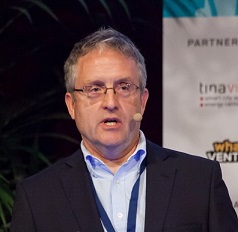A WEEK IN TELCO IT – The news hasn’t improved much lately, and it’s tough to digest a diet of disaster in the media, says Jeremy Cowan. We have to hold our hands up here for sharing tough news in www.TheEE.io , www.IoT-Now.com , and www.VanillaPlus.com ). So, don’t think I’m in denial when I try to lift the spirits a little by sharing some positive news crossing my desk this week. First, however, let’s set the context.
European SITS investment may ‘only’ fall 3%
A report from Munich-based industry analysts, teknowlogy Group this week says that the software and IT services (SITS) market in Western Europe is likely to decline post-pandemic by between 3% and 12% in 2020, based on two scenarios developed by the group. Yes, they call the first scenario, ‘optimistic’.
In it, the group envisages the virus’s peak being successfully managed in three months (by late July), with lockdown measures eased before the end. But in the more pessimistic scenario, teknowlogy Group outlines a six-month period of peak management, meaning most organisations would not return to business as usual until Q4, 2020 or even Q1, 2021.
I can hear you now. “Jeremy, if this is you being optimistic I’m out.”
Bear with me, it gets brighter, but to see the light we need to start in the dark.
Christophe Chalons, EVP and chief analyst, says: “We have based our expectations on a number of factors including the speed at which the virus is spreading across different regions, the extent and duration of the lockdown, and how successful government measures are proving to be. But the global nature of the economy means that no country in Europe can avoid the impact on international supply chains and customer demand.”

SaaS stays strong
teknowlogy Group believes that some areas of the SITS market will suffer more than others. While they currently expect overall spending in the software space to decline by between 0.1% (optimistic) and 8.7% (pessimistic), they believe that growth in spending on Software-as-a-Service (SaaS) solutions will remain strong, particularly in areas such as tools to support remote collaboration and communication.
In the IT services sector, the group expects spending on consulting and systems integration to take an immediate and significant hit as businesses postpone longer-term strategic initiatives and delivery teams supporting new platform implementation are disrupted by the lockdown. Outsourcing investment will remain more resilient, and the renewed focus on cost control may drive new opportunities in the medium term.
Of course, different industry sectors are impacted in different ways. While telecoms and utility companies continue to operate with relatively low levels of disruption, the transport and services industries will see the biggest impact on SITS spending in 2020.
In the transport sector, airlines have grounded most of their fleets, and a slump in revenue means a focus on cost control across all areas of the business – and IT is no exception. The services sector covers a broad mix of businesses, and clearly there are parts of this industry that are really suffering, such as hospitality, tourism and leisure. A high proportion of small to medium-sized enterprises (SMEs) in this sector are vulnerable on cashflow, and for many sub-segments, ongoing restrictions on travel and social gatherings mean the recovery will take some time. (See: www.sitsi-covid19.com).
Nuance enhances telehealth with ‘ambient-experience’
One area that has seen a bit of a boom set off by COVID-19 is remote healthcare. Amid the crisis, Nuance Communications (NUAN) has launched its Dragon Ambient eXperience (DAX), an extension of the company’s Dragon Medical solution.
Nuance says DAX securely captures and contextualises doctor-patient conversations and enables virtual examinations. Using the solution, physicians can be trained remotely, patient consultations can be captured securely, and DAX automatically creates clinical notes.
Road to recovery
One of many vehicle makers doing what it can to help combat the coronavirus is Jaguar Land Rover. JLR has deployed hundreds of cars globally to support emergency response organisations, including 57 vehicles to the British Red Cross, to deliver medicine and food to the elderly and vulnerable across the UK.
Jaguar Land Rover has also donated protective equipment to the UK’s National Health Service (NHS), and it will be producing up to 5,000 visors a week for key workers, who are facing a national shortage of personal protective equipment (PPE). Developed in consultation with NHS professionals for efficient rapid prototype printing at the Advanced Product Creation Centre in Gaydon, home to one of Europe’s most advanced 3D printing facilities, each face visor has been designed to be reusable, and can be easily dismantled and cleaned before being re-used; safeguarding against future PPE shortages.
Call to action across the IoT ecosystem
IoT network operator, Sigfox USA started an enterprise-wide response when it challenged the IoT industry to deploy technology to help reduce the impact of the ongoing pandemic. This resulted in a special offer, in agreement with parent company Sigfox Corp, to waive all connectivity costs in the areas it covers until July 31st, 2020, for projects directly contributing to fighting the pandemic.
Sigfox believes that the IoT can help to mitigate the effects of the crisis. Tracking and monitoring supply chains, managing stocks of medical supplies, assisting healthcare workers and providing patient assistance buttons in temporary hospitals are all ideas identified for IoT support in the global fight back. If you want more details, email Glen Robinson, SVP Sales and Marketing or Bertrand Rame, SVP Expansion & Partner Management at: fightcovid@sigfox.com.
How can the Events sector bounce back?
It was only a matter of time before the GSMA announced last week that one of the leading technology events in China, MWC Shanghai, was to be cancelled.

If Dr. Plamen Russev, executive chairman of the Board at Webit.Foundation is any judge, however, there are reasons for optimism even in the Events sector, an industry ravaged by the effects of lockdown. He says, “I thought it is highly inefficient and a waste of opportunities and resources to travel to attend events, to stay away from the family and the office, to cast a significant CO2 footprint and for the result to be (on average) only 20% new contacts while Webit is hosting 15,000 attendees from 120 countries (73% of them C-level/top management).”
According to a report from Oxford Economics, “the ROI (return on investment) on conference and live trade show participation is estimated at between $4.00 and $5.99 per dollar invested; 40% of prospects become new customers after a face-to-face meeting vs. just 16% without and 27% of current business would be lost if it wasn’t for in-person meetings.”
Russev cautions, it is not only about new leads and sales, live events are (or were) about thought leadership and innovation. He quotes event software provider, Bizzabo saying that, “62% of leadership (vice presidents and C-Suite) agree that in-person events are the most critical marketing channel to achieve key business objectives and demonstrate thought leadership.”
Now, of course, most live events are forbidden by law.
The future’s in the 20% / 80% ratio
The above ROI statistics are possible in normal times, even though only 20% of the contacts made by the average businessperson at in-person events are new contacts. The rest of the time attendees spend meeting people they already know.
So, the Webit Foundation began searching before the crisis for a tech solution to make its Webit Festivals more effective for sponsors, exhibitors and attendees. They have been fighting lack of response, ineffective in-app networking and the fact, says Russev, that not much has changed in the events industry for years. Now, he says, “thanks to TheVirtual.Show we have been working on virtualisation of Webit and adding an artificial intelligence (AI) and networking and virtual layer for one year already and thus we were the first in the world to launch our Webit Virtual Program last month.

He reports that, through AI-powered matchmaking algorithms, as well as the virtual exhibition and attendees, “Webit Virtual has already outgrown Webit Festival by 10-fold,” and is turning it into “the world’s biggest Thought Leadership Network and a place where the business happens in the virtual space.” Russev adds that, “analytics of Webit Virtual’ audience shows that every live programme boosts over 8,000 virtual live attendees (over 64% C-level/top management audience) and hundreds of thousands of views.”
I just want to applaud the creativity that these difficult times have inspired in so many of you. Good luck in your own ventures, and we will be announcing more of our own responses very soon. Until the next time, keep safe and I hope technology smiles on you.
The author is Jeremy Cowan, editorial director and publisher of VanillaPlus.
Comment on this article below or via Twitter: @VanillaPlus OR @jcvplus






